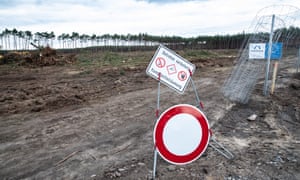
German environmentalists and political leaders are at loggerheads over plans to build a Tesla electric car factory on the site of woodland outside Berlin, with the government casting doubt over the future of a project seen as key for its support of green technologies and regeneration in the east of the country.
The economy minister, Peter Altmaier, said this week that delays could threaten the go-ahead of the so-called Gigafactory, which is expected to employ up to 12,000 workers making 50,000 electric cars a year.
On Sunday a court orderforced a halt to an operation to clear 92 hectares of pine trees at the site in Grünheide, 24 miles (38km) east of Berlin.
The environmental group Grüne Liga Brandenburg (Green League Brandenburg) said the US company was being given “preferential treatment” and should not be allowed to start felling trees until it had been granted full building permission.
“To fell half of the forest when many aspects of this process are yet to be clarified seems fairly problematic, which is why we have asked the court to deal with it,” said Heinz-Herwig Mascher, of Grüne Liga. “It is not that we have something as such against Tesla as a company or its objectives. But we are concerned the preferential treatment they’re being given could set a precedence.”
Grünheide residents are divided over the issue. The town, home in the 1920s to a Bakelite plastics factory, has repeatedly missed out on any big economic success in the decades since reunification.
At pro-Tesla demonstration, locals said they were proud that an industry promoting a low-carbon future wanted to make its home in Grünheide. “We’ll be on the map for something positive and we might even get to test drive the cars,” said Elke, a gardener. “I also hope the factory’s presence will improve the local bus service.”
Steffen Schorcht, the founder of a citizens’ initiative against it, said people felt “bulldozed” into accepting the project before basic questions had been answered. “Of course you always have to weigh up the economic interests with those of environmental protection,” he told Die Zeit. “It’s important to involve the locals in the discussion from an early stage, and that simply did not happen here. The people are supposed to feel blessed by the fact that Tesla is coming and bringing many jobs with it.”
His campaign has raised concerns about chemical pollution and water use in a region that has suffered for decades from low rainfall. Tesla has said water consumption could be up to 372 cubic metres per hour, which some fear could drain the local lakes. “The politicians know how explosive this water topic is, and have tried to play it down, both to Tesla and the inhabitants,” Schorcht said.
The local wing of the anti-immigrant AfD party has suggested the project will be of little benefit to Germans and that Tesla will seek to bus in lower-paid workers from nearby Poland.
Among environmentalist concerns are the protection of bat colonies and ant hills. There are also worries about unexploded ordnance. Bombs and other munition weighing a total of 85kg from the second world war have been found at the site and detonated.
Musk has addressed the environmental concerns, stating that Tesla’s water usage would be much lower on a daily basis than the “rare peak usage” quoted to German authorities. For every tree the company fells, it has promised to plant three more. “Sounds like we need to clear up a few things!” he said in one of many tweets about the plant.


0 Comments